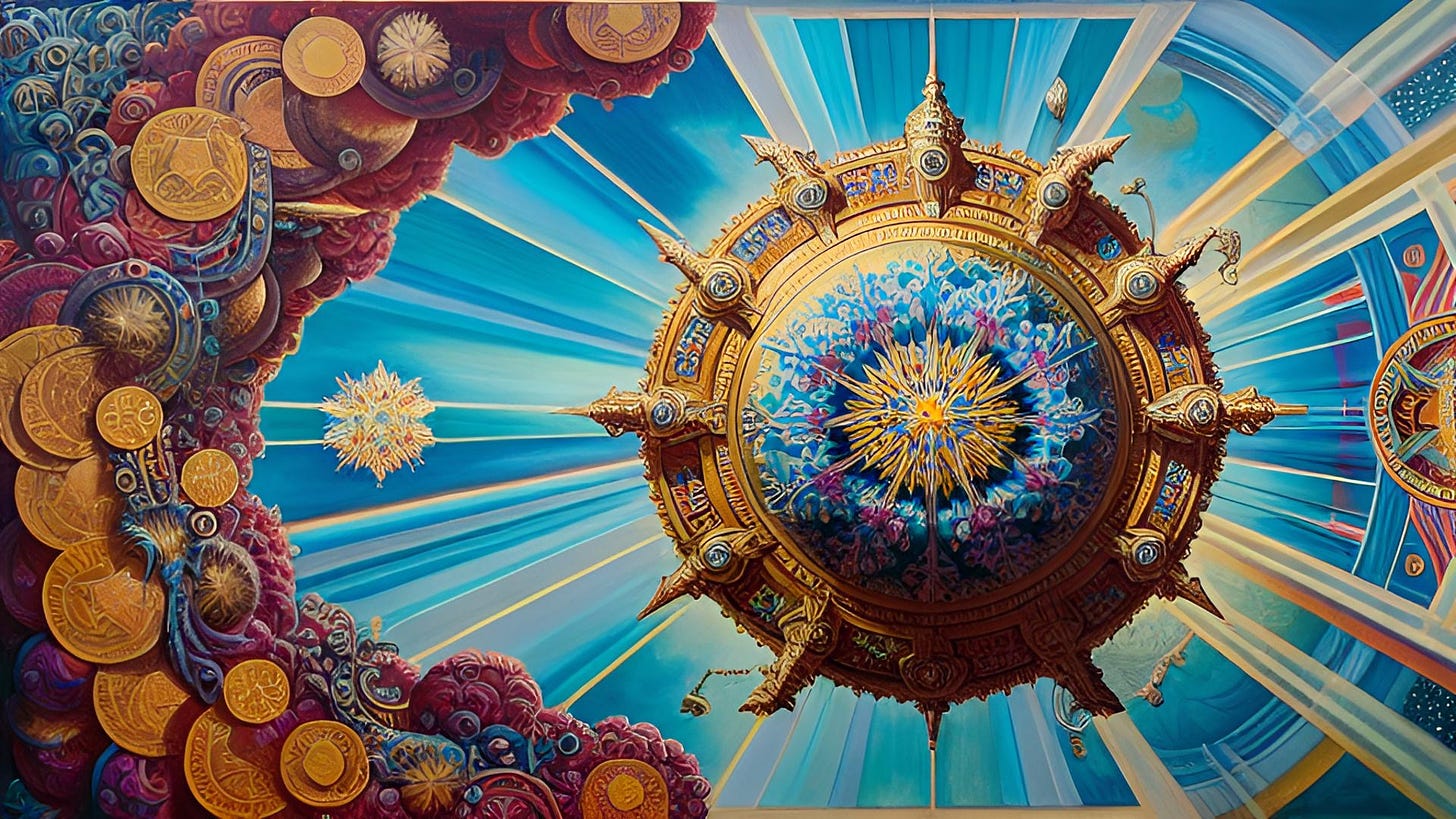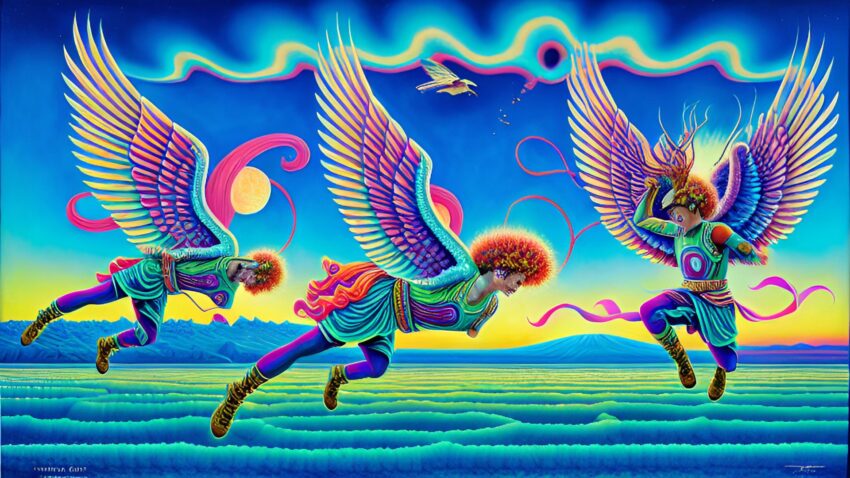cross-posted here
Heraclitus posited an ever living fire that acts as the medium of exchange for all transformation. Parmenides stressed the world’s un-changing regularity as the stable background of all transformations. Thales is credited with creating the first futures contract. Socrates invokes markets, coinage, and merchants in many of his dialogues, challenging the accumulation of wealth as a worthy telos. Plato’s Republic uses monetary metaphors when describing the guardian elite, the merchant middle class, and the lower castes as having gold, silver, and bronze souls respectively, implying the tight relationship between scarcity and value. Aristotle explicitly names the qualities of money that give it its ‘money-ness.’
Coinage may have been the “implicit carrier” of metaphysical concepts that arose at the time, while predating two monumental junctures in Western history:
- The Renaissance — innovations such as double-entry accounting, banking, paper currency and other sophisticated tools preceded and likely facilitated an explosive rebirth in science, art, and culture in Italian city-states
- The Enlightenment — additional monetary advances preceded this period, which saw northwest Europeans utilize joint stock corporations, government bonds, and central banking mechanisms.
And in the current day, wealth can be stored on the blockchain. With nods to Nick Land (‘Bitcoin is ‘a philosophical automatism, a synthetic philosophical machine’ that ‘threatens to change the way everything is thought and done’) and Nayib Bukele’s philosopher-king orientation, Mav highlights an unprecedented opportunity that’s available, particularly as masculine-feminine clash-points articulate themselves as a right/left divide:
The struggles of boys and men are well documented by this point. However, the opening of the crypto-frontier provides opportunities for financial gain, cultural patronage, as well as new forms of social organization that will serve as a powerful tool for new ways of thinking and the formation of parallel institutions that aren’t actively hostile to a more masculine orientation. To put it in internet terms we’re all familiar with, crypto is a critical tool for men and for philosophy itself to dig its way out of the 20th century “longhouse.”
The piece is available here.
UNLEASHED THOUGHT
The Land reference inspires a look back at the source document (“Crypto-Current: Bitcoin and Philosophy,” which was published in 2018).
Land’s musings have lysergic aesthetics that demonstrate the McLuhan principle like nothing this side of Latin Mass. (Case in point, Xenobuddhism, i.e., “the technocommercialist takeover of dharma…” and all its mutagen imagery.)
As an aside, and at the risk of sounding silly and overwrought, we might describe reckless psychedelic encounters (and other limit-experiences) in poetic terms, e.g., “storming the gates of heaven.” (As alluded to in Jasun Horsley’s great book, Prisoner of Infinity.) The best of Land’s writing has this kind of energy, with a process that seems quite good at presaging future truths. Or maybe Land simply has a unique gift for speculative cyber-fiction and, and through this work, is able to collate wild signal from even wilder noise.
Here’s a passage from the Bitcoin and Philosophy piece that originally drew me in, as partially cited in Mav’s piece at Man’s World.
Bitcoin seizes philosophical attention because it is already doing philosophy – or what philosophy is still (on ever rarer occasions) expected to do – and at multiple levels. It tells the truth. Bitcoin is not only a recognizable philosophical statement, but also, and more importantly, a philosophical automatism, a synthetic philosophical machine.
It not only philosophizes in the manner of a man – although this is its certain prospect – but also finally in the way of an angel, or a lesser god. The ‘intellectual intuition’ (Intellektuelle Anschauung) that is for Kant a mortal impossibility, is for Bitcoin an operational principle. It is destined to close upon itself, and thus know itself. By becoming time, Bitcoin promises an exhibition of unleashed thought, in a way no introspective anthropology ever can.
The Cybernetic Culture Research Unit, a group of academics that Land was associated with in the 1990s, foresaw “cyber-hype techonomics,” i.e., the accelerated interplay between technology, economics, and hype: a new world of techno-commerce marked by exhilarating innovations…but also rife with scams and thieves. This new frontier, messy though it may be, offers ways toward truth outside of current channels, which are mostly limited to brute force of will.
Land’s Xenosystems is now available for purchase at Passage Press.
WRITING WITHOUT SUBTERFUGE
On the subject of Alamariu, another Man’s World author, Stephen Pimentel, provides a good review of the former’s doctoral dissertation, Selective Breeding and the Birth of Philosophy, here. He suggests that Alamariu carries on the tradition of authors who were willing to “write without subterfuge,” ala Jünger and Céline. Per Stephen, Alamariu highlights the dichotomy between nomos (custom, convention, law) and phusis (nature). While nomos was useful as a mechanism for social restraint and order, phusis entailed vitality and inherited traits, which promote excellence. Over time, aristocracies crumbled and gave way to democracies; during this period two archetypal figures embodied the idea of nature as a metric for value: (i) the philosopher and (ii) the tyrant:
To bring out philosophy’s relation to tyranny, Alamariu turns to the conversation between Callicles and Socrates in Plato’s Gorgias, in which Callicles argues for tyranny and Socrates ostensibly tries to refute him. Far from a simple opposition of these two figures, however, Plato shows that Callicles and Socrates are both moved by an eros no longer bound by nomos and so are kindred types. (This relation of character between tyranny and philosophy is also explored in the Republic.) Callicles’ first speech (Gorgias 483e-484b) is particularly important. There, Callicles speaks of great men who follow nature, indeed the “law of nature,” and hold this to be definitive of true justice, the “nature of right.” Most men are conditioned from their youths by the “spells and witchcraft” of convention to accept equality, but when a great man arises with “enough nature,” he shakes off the “charms” of convention, including the “laws which are against nature,” becomes a master, and shines with the “right by nature.” Callicles uses Pindaric language throughout the speech and then partially quotes [the great poet] Pindar’s fragment 169, though he does “not know the poem well.”
Callicles is particularly interested in the manner in which nomos of convention suppresses the nomos of nature. It is not by physical force or punishments, but rather by speech in the form of myths and lies whose effect is mental enslavement. If a young man of strong character comes to understand how such convention works and how it is contrary to the truth, he has a duty to free himself from it bonds.
All this threads nicely into Mav’s piece and the theme that new monetary technologies can help combat the falseness oozing out of current-day “customs” and “order.”

